Argentina bans abortion in most cases. So why is its abortion rate far higher than that of the U.S.?
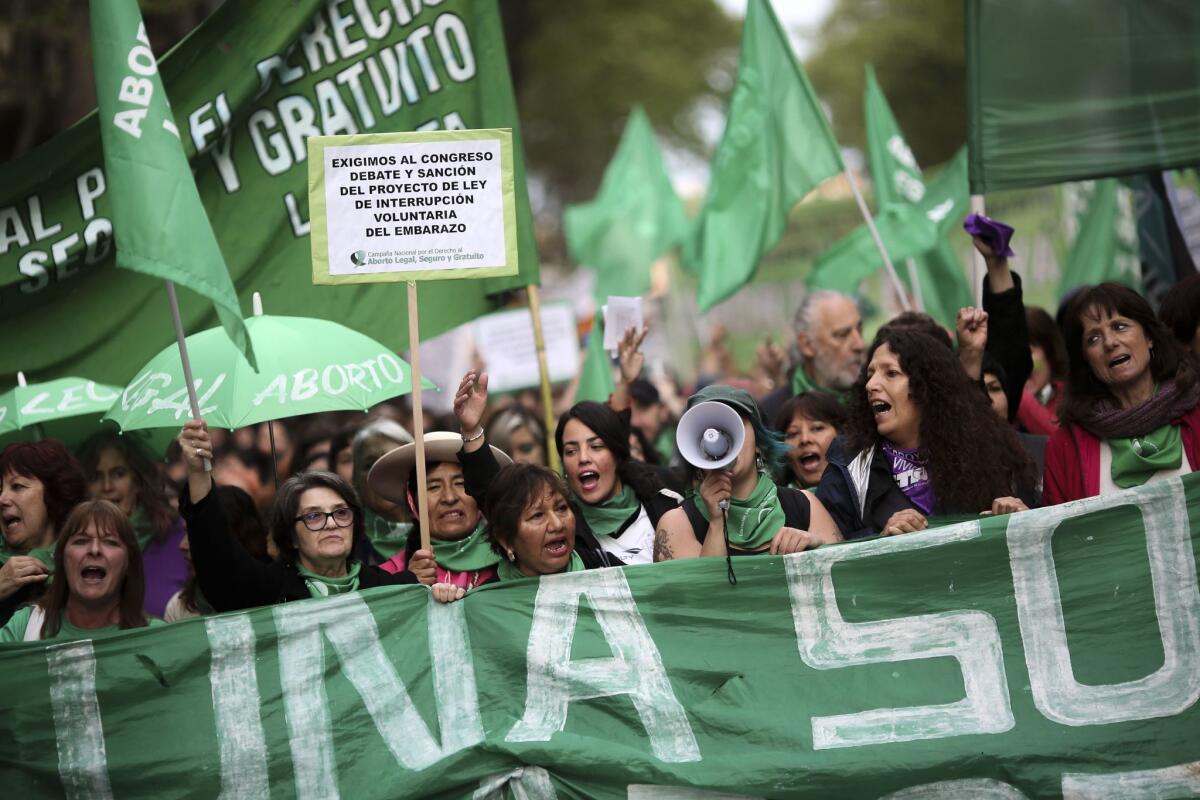
- Share via
The woman stumbled into a public hospital late one night, her stomach turning as she approached the lobby. She was bleeding.
Dr. Damian Levy ushered her into a room. Like many of his patients at Hospital Alvarez in Buenos Aires, she was young and poor. At first, she refused to tell him why she was there.
Then she burst into a tearful confession. She had tried to perform her own abortion at home and used 40 tablets of the drug misoprostol — nearly three times the suggested dosage for inducing a miscarriage. She was worried that the hospital would report her to police.
In Argentina, and across much of Latin America, where edicts of the Catholic Church are often enshrined in law, elective abortion in cases of unwanted pregnancy is illegal.
Yet the laws are widely circumvented, and researchers are finding that the abortion rate in Latin America is far higher than it is in the U.S. and other places where the procedure is legal. In Argentina, where tensions between the church and secular society run especially high, the government estimates that between 370,000 and 522,000 abortions are performed every year, most of them illegal, very few of them prosecuted.
Driving the numbers are a growing group of activists dedicated to making abortion drugs accessible to the poor and doctors willing to stretch the rules. None of that is a secret to authorities or politicians, who rarely discuss the issue publicly.
A survey conducted by the Pew Research Center in 2014 asked adults in Argentina about their views on “abortion in all or most cases” and found that about 60% oppose legalization while 37% support it.
Argentina tries to appease both sides. It keeps abortion illegal — except in cases of rape or when a pregnancy poses a health risk — but allows it to continue anyway to meet the significant demand.
This tightrope act has made complications from abortion the leading cause of maternal death. The procedure is often performed without medical expertise, and the stigma and fear around it means many women wait longer into their pregnancies, when the risks are higher.
That leads to emergencies like the misoprostol overdose that Levy found himself dealing with.
“I have seen women take two, eight, 12 pills,” the doctor said. “Never 40.”
Levy immediately performed a surgical abortion. The woman survived.
In the twisted logic often employed to navigate the abortion law, he explained that she was in no danger of being turned into police for an illegal abortion, because using so many pills had put her health at risk.
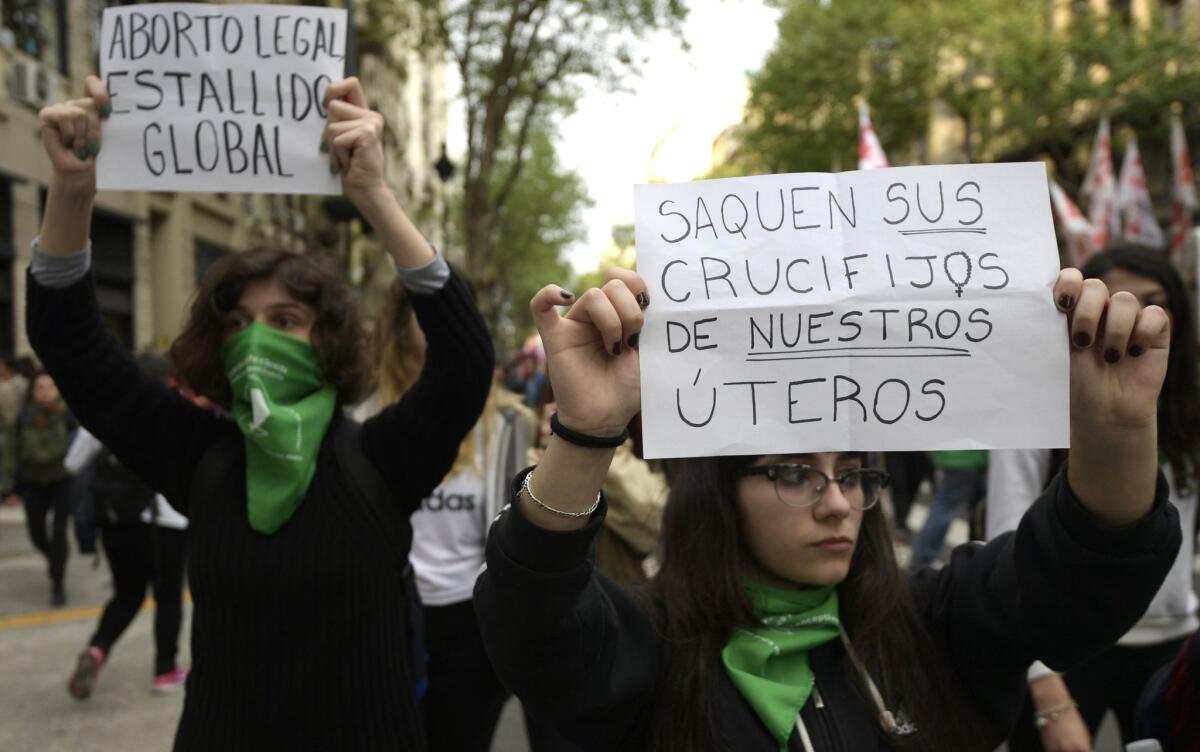
On the front lines of expanding access to abortion are women like Maria Victoria Mateu.
Her own experience with abortion — a legal one in 2002, after an ectopic pregnancy put her health at risk — turned her into an activist on the issue.
The 34-year-old started protesting for gender equality and working with a national campaign to overturn Argentina’s 1922 ban on abortion. She eventually became a socorrista, or first responder, in a national network that helps women get misoprostol.
The drug, which was developed in the 1970s to treat stomach ulcers, can also be taken orally or inserted in the vagina to induce labor and abortion up to 12 weeks into a pregnancy. Relatively cheap and widely available, it has become a go-to method for abortions in countries that forbid them.
Mateu sees it as blessing for poorer women, whose only other options for abortion are crude techniques such as inserting knitting needles, or drinking herbal concoctions.
Many women who seek her out live in villas miserias, urban shantytowns where access to public hospitals is limited. Some are victims of domestic abuse who can’t tell their spouses that they want to end their pregnancies.
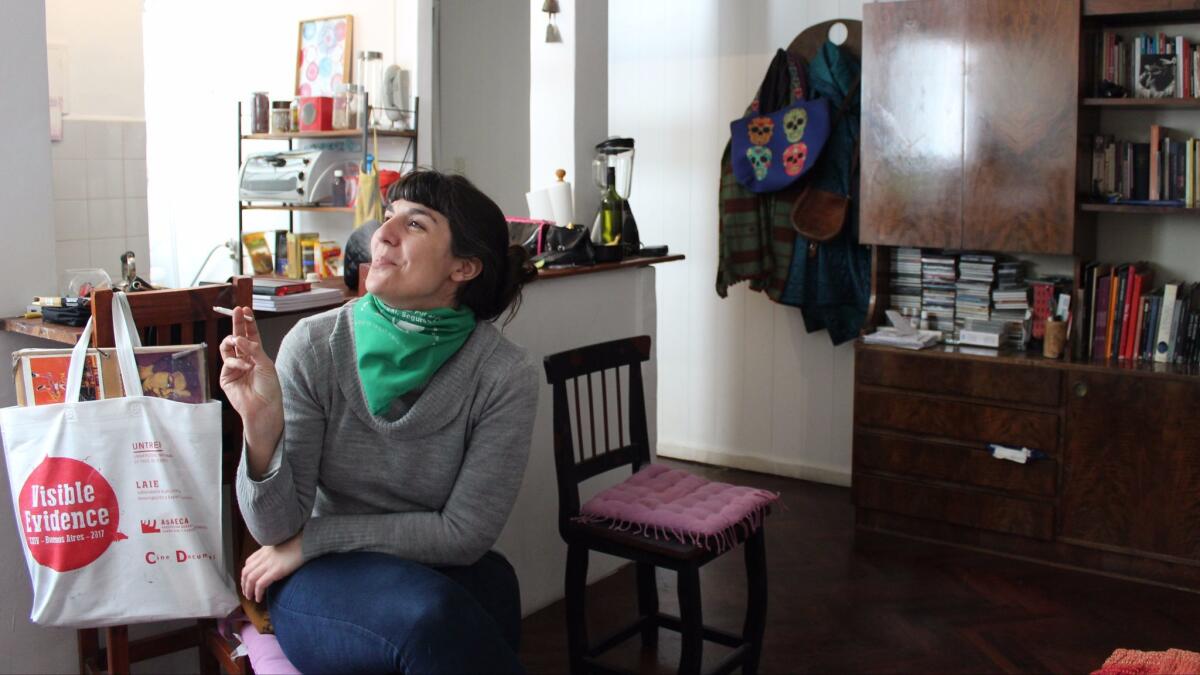
Mateu gives a pamphlet on misoprostol to each woman and answers their questions.
Misoprostol is sold in pharmacies for around $100 with a prescription and twice that without one. Some women will conscript an older relative to fake an ulcer and ask for it over the counter.
After an abortion, Mateu makes sure the woman sees a doctor for an ultrasound. This is the most important part of the process because it catches infections so they can be treated, she said.
Since she started two years ago, Mateu has instructed more than 100 women on how to induce abortions.
“What socorristas do is deal with the right to information,” she said. “And information is legal.”
Still, she takes some precautions. She insists on meeting women face-to-face, often at La Dignidad, the leftist coffee shop at the end of her street. They text in code — substituting zapatillas (sneakers) for pastillas (pills), for example.
In extremely rare instances, women in Argentina have been prosecuted for having illegal abortions — most famously the case of a 27-year-old that the media referred to only as Belen to protect her privacy.
She went to a public hospital in the conservative city of Tucuman while having a miscarriage only to be accused by hospital staff of inducing it herself and convicted of murdering her unborn child. The case sparked rallies in her defense.
Sentenced to eight years in prison, she served two before being acquitted last March.
German Cardoso grew up in a devout Catholic home. His father was a doctor and his mother taught classes on the catechism. He never thought much about the church’s prohibition on abortion.
Then about 15 years ago, well into his own career in medicine, an older woman knocked on his clinic door. She said that years ago, his late father had performed an abortion for her. Now, she needed his help with ending her granddaughter’s pregnancy.
Cardoso was shocked to learn about his father’s secret and promised to help.
“It changed me, because from that moment I was always living in conflict,” he said. “The pressures of society, my Catholic family, the law.”
He decided to offer abortions to prevent women from risking their lives by ending their pregnancies on their own. It felt like the right thing to do — and he was relieved to discover that despite the law it was unlikely to land him in legal trouble.
The worst he has faced was a raid on his office in Buenos Aires in 2011. He was arrested and held for two days before the case was dropped and he returned to performing abortions.
He has since moved his clinic five hours southwest to the conservative city of Tandil, where he has withstood occasional ridicule in the press, and once vandalism of his clinic sign, but has never been hassled by authorities.
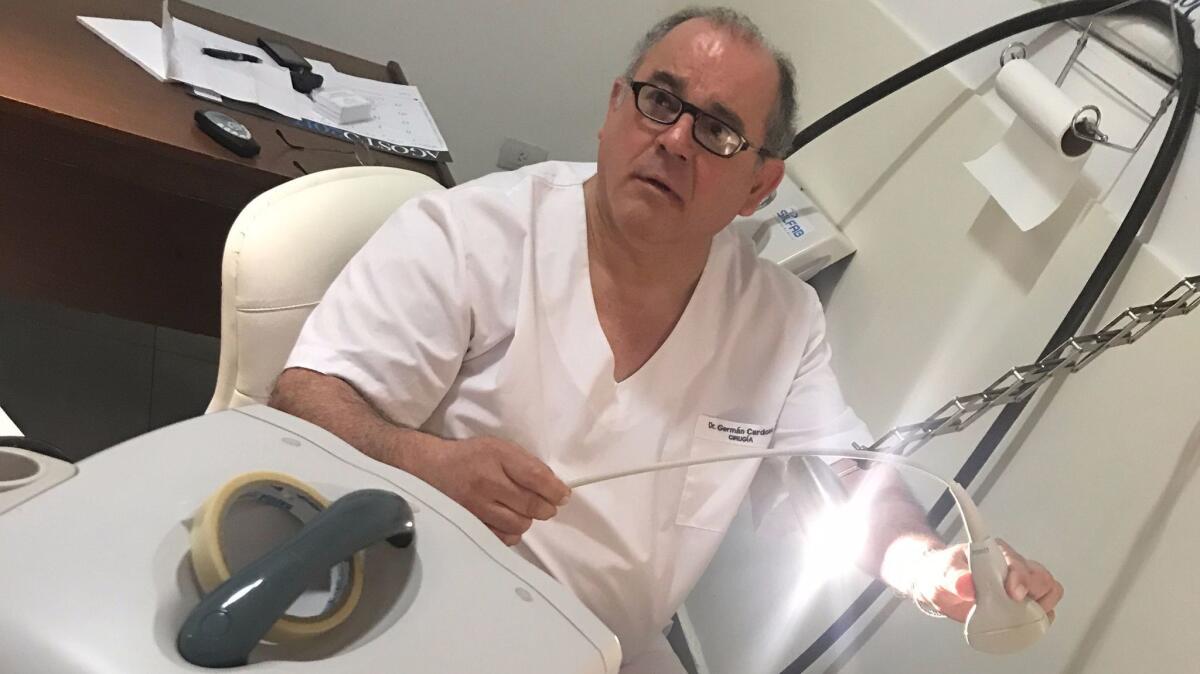
“I knew it was bad for my image as a doctor to do abortions,” he said. “I don’t like being called ‘Dr. Aborto,’ but I wouldn’t change what I do.”
Now 60, he said he performs about 30 abortions a month, charging $1,000 — or nearly twice the monthly minimum wage in Argentina — for women who can afford it and less for those who can’t. Lately his business has seen a downturn due to competition from the local hospital, which has been increasingly willing to provide misoprostol.
The law itself provides wiggle room for doctors who perform abortions — in that it allows abortions when a woman’s health is at risk, but fails to define “health.”
That allows abortion providers to use the World Health Organization’s definition: “a state of complete physical, mental, and social well-being and not merely the absence of disease or infirmity.”
If a woman is depressed over her pregnancy, or if having a child puts her socioeconomic well-being at risk, her abortion is legal, Cardoso said.
Still, many doctors at public institutions are reluctant to push the rules.
“There’s a lot of hypocrisy,” said Dr. Eugenia Arroche, one of three doctors who performed the 80 legal abortions at Hospital Alvarez last year. “Doctors say they’re against an abortion, but when someone they know needs one, they will ask another doctor to do it for them.”
The hospital requires women seeking abortions to make the request in writing and list the reason.
One woman, who spoke on the condition that she be identified only by her first name, Maria, decided to seek an abortion after learning that the baby she was carrying had a fatal respiratory defect and would be unlikely to live for more than a few hours.
With no legal exception for birth defects, her gynecologist stalled for weeks, saying he needed to consult the ethics committee at the private hospital where he worked and at one point suggesting she seek out an illegal abortion.
“The system is very cruel,” she said.
She was more than 20 weeks pregnant by the time she wound up at Hospital Alvarez, where Levy performed her abortion last year.
It was legal, he said, because her mental health was threatened by the prospect of giving birth only to watch her baby die.
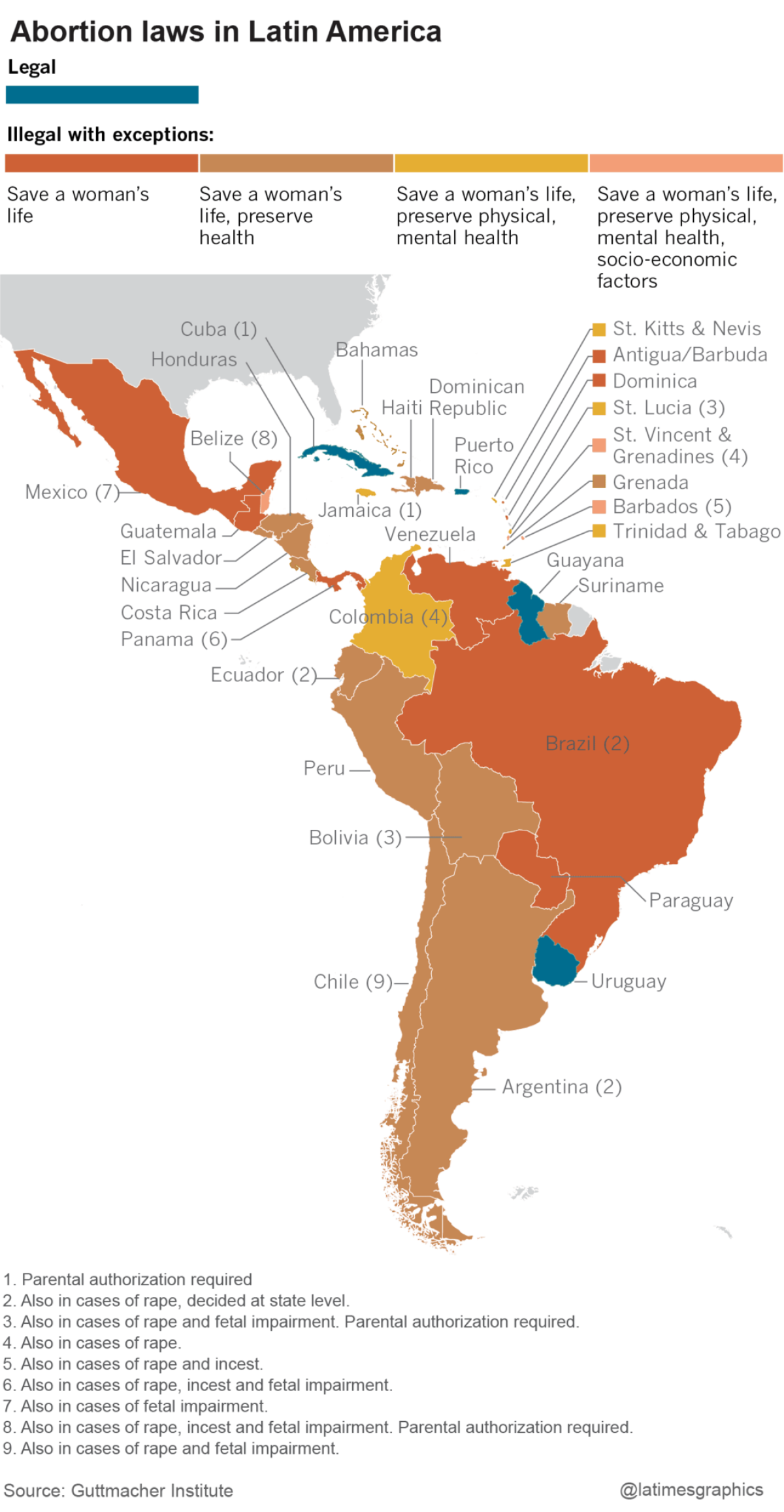
Twitter: @sarahparvini
Parvini reported on a fellowship from the International Reporting Project.
ALSO
Legal battle ends: Detained immigrant obtains an abortion
Why the Department of Health and Human Services should stop saying life begins at conception
Supreme Court weighs challenge to California's abortion disclosure law: Does it violate free speech?
Sign up for Essential California
The most important California stories and recommendations in your inbox every morning.
You may occasionally receive promotional content from the Los Angeles Times.








